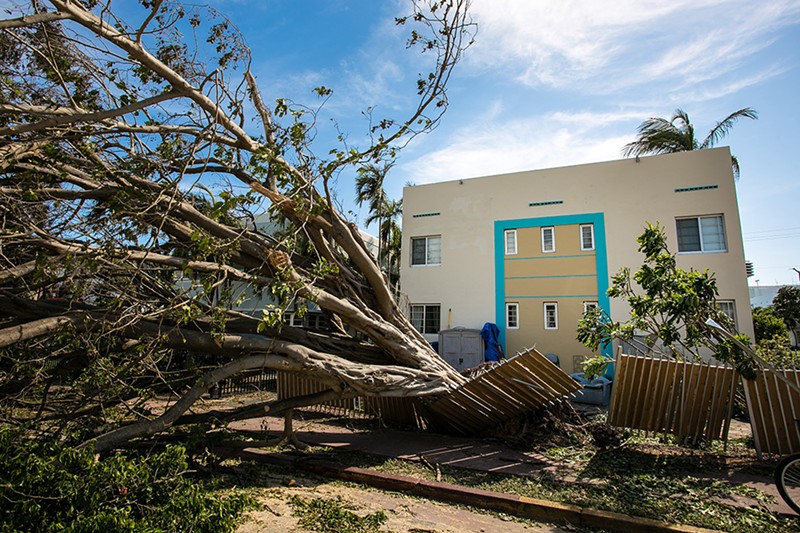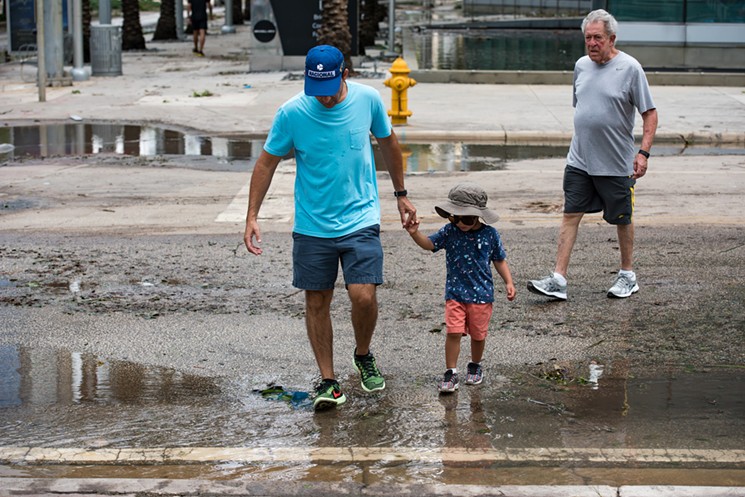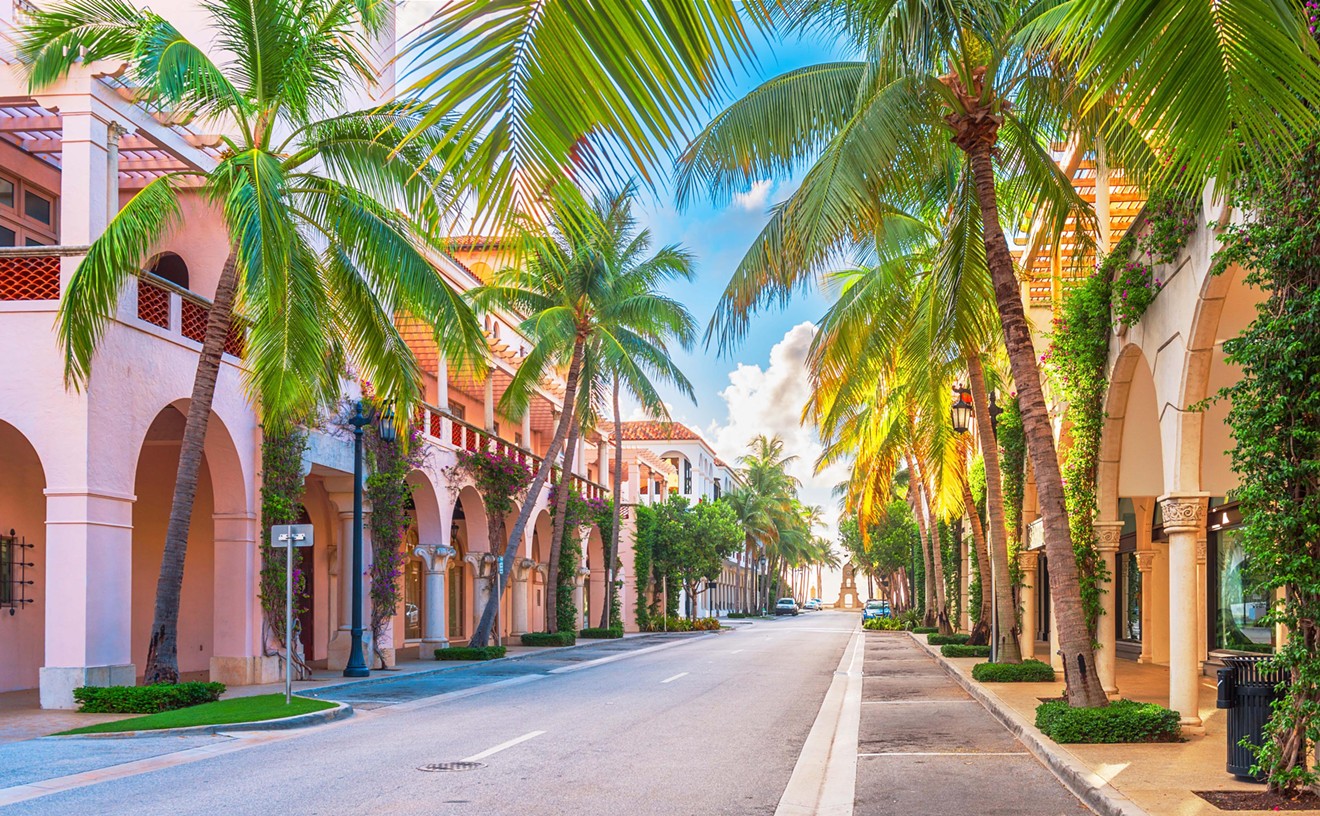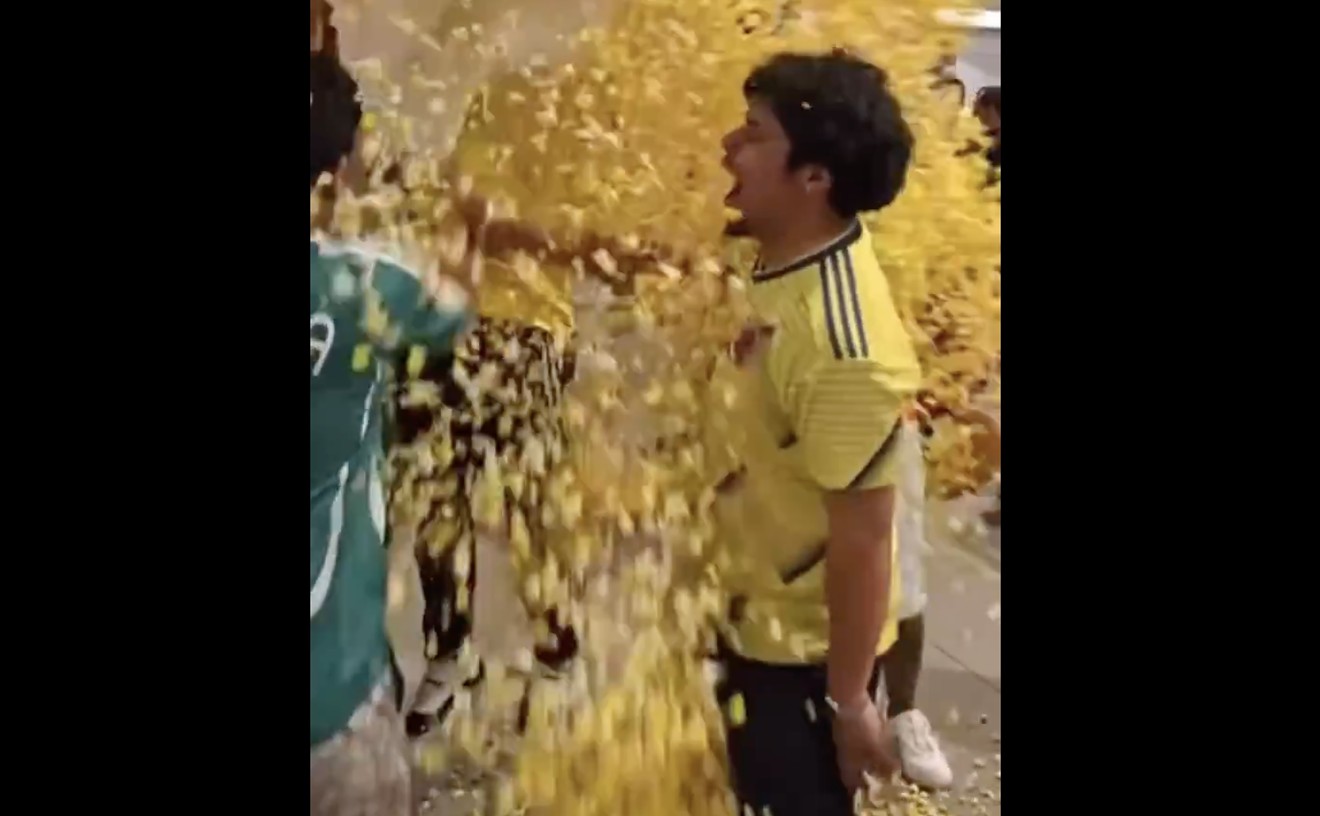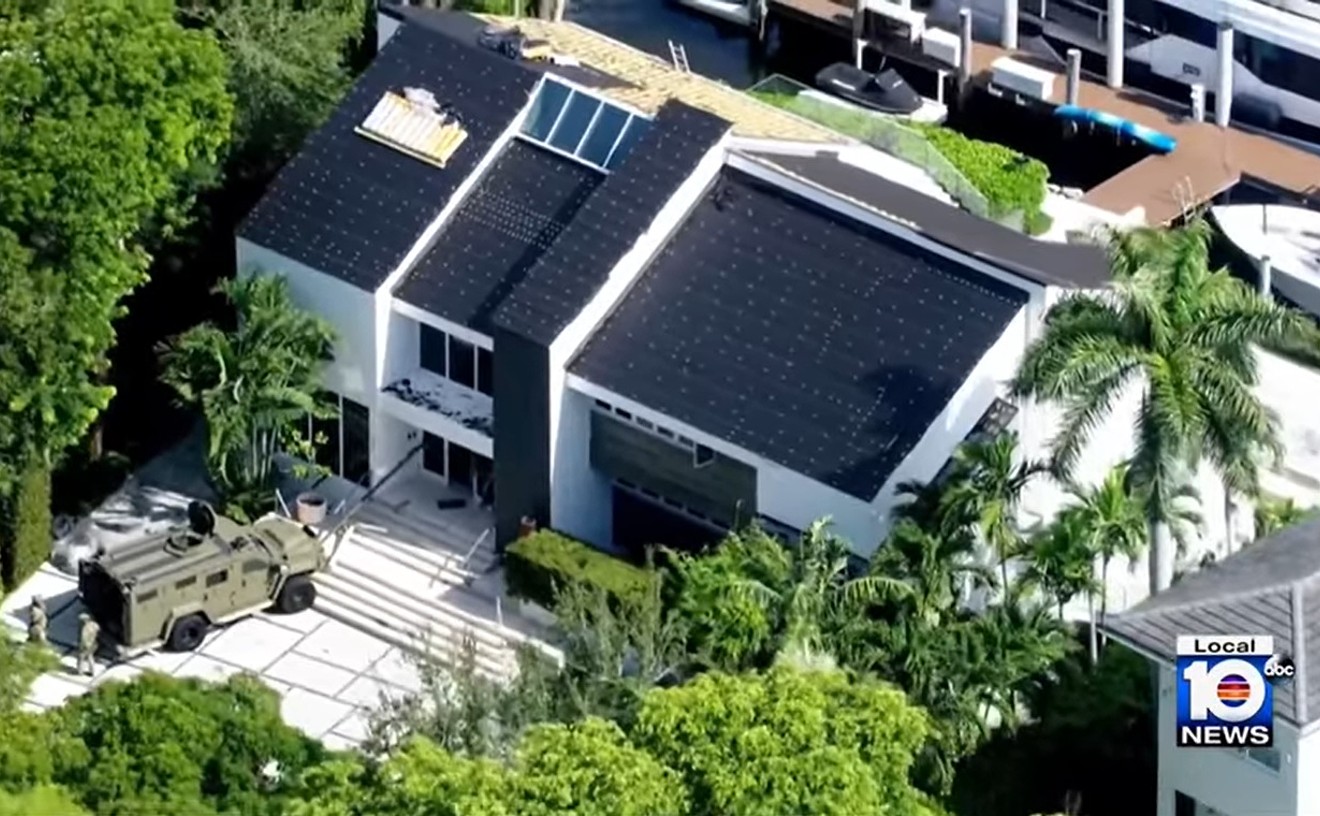The line snapped in the screaming gusts, and Randy knew he was in deep trouble. White-capped waves battered the chipped hull of Hardball, his 36-foot fishing boat, while 100 mph winds tore through the faded blue canvas over the captain's chair. In the middle of Hurricane Irma's Sunday-afternoon assault on South Florida, Randy's borrowed boat was suddenly in danger of going adrift. Only the stern was tethered to the Dinner Key Marina dock.
With his weathered face, spiked hair, and captain's glasses, Randy is a dead ringer for the cartoon mascot on Shock Top beer labels. But among the salty characters who live on sailboats and fishing charters in the Coconut Grove marina, he's better known as "Captain Skeletor" for his comically wiry frame. ("I turn sideways and the cops can't see me," he likes to joke.)
As Hardball rocked crazily in the maelstrom, the middle-aged fiberglass repairman braced himself and took stock. Through the horizontal downpour, he could barely see palm trees snapping in two on the shoreline. It was 4:30 p.m., but the sky was a murky gray. And worst of all, as he peered over the side, he realized that his escape plan — a small dinghy — had already been swamped. He had only one choice left: Swallow his instincts, leap off the boat, and try to swim to dry land.
"I'm a pretty badass guy," says Randy, who declined to give his full name, hinting at legal issues. "I've been shot at. But it's no fun being out there when you're helpless."
Like many in Miami that afternoon, Randy had come to a hard realization: He hadn't taken Hurricane Irma nearly seriously enough.
Sure, panic had gripped the city for nearly a week before the storm. There were lines at Publix that would have made a babushka blush, and bottled water was harder to find than a Trump yard sign in South Beach. Gas wars grew so savage that a guy in South Miami pulled a gun at the pumps. Florida's Turnpike and I-95 became car graveyards as millions tried to flee and eventually gave up.
Then, on Friday, September 8, the city's desperate street-corner brujería paid off: The forecast models abruptly jumped west. As the Category 5 monster re-aimed at Florida's Gulf Coast, Miami giggled and cracked open its hurricane whiskey early.
Unfortunately, a raging, 145 mph bastard showed up Sunday morning — nearly 20 miles east of those projections. Gulp. Tens of thousands of Miamians, many of whom had moved to South Florida since Wilma hit in 2005, quickly learned they should have paid Irma a lot more respect.
As the 'cane chewed through the Keys, its dirty side whipped Miami with hurricane-force winds and storm surges that swallowed Brickell street signs whole and transformed underground garages into Lamborghini aquariums. More than 1.5 million homes went dark. Massive cranes toppled off luxury high-rises. Statewide, at least seven people died in the chaos.
After all the memes — Irma-gerd! — it turned out this storm was no joke at all.
"I thought we were going to get like tropical storm winds, that everyone would be all right," Randy says today. "I was wrong."
Locals rode out the storm everywhere from Little Haiti trailers to million-dollar Brickell condos to rickety Dinner Key boats. Their stories suggest a hard lesson learned this weekend by a fast-growing metropolis: We're not even close to ready for a major hurricane in the Magic City.
Before the Storm
When the man wearing a fanny pack pulled out a handgun and started screaming, everyone in the crowded gas station froze. It was late Wednesday, September 6, and like hundreds of others, the gunman had endured hours in line for the chance to fuel up his car at a Mobil station at Coral Way and SW 32nd Avenue. But now he'd been pushed too far. Someone had gotten between him and his gas just as supplies were dwindling.
"The guy was mad and impulsive and pulled out the gun, immediately regretting it afterwards," says a woman named Melanie who filmed a clip that later went viral. "He drove away speeding."
After days of crippling anxiety stoked by ever-more apocalyptic forecasts, Miami had finally reached its boiling point. Angry Fanny-Pack Man, for many, embodied a city trapped at the tip of an endless peninsula about to be demolished by a historically giant storm.
For nearly a week before that emblematic moment, Irma had been setting ominous records. Weather watchers were stunned as a loosely organized wave in the mid-Atlantic boiled into a fearsome Category 3 'cane. As it approached the Leeward Islands, Irma ramped up to 185 mph and grew to more than 300 miles wide.
Miami watched warily as Irma's forecast cone crept straight west, unfurling on maps like a Burmese python determined to swallow the Sunshine State whole. On Monday, September 4, Florida Gov. Rick Scott preemptively declared a statewide emergency, and locals began whispering a forbidden word: Andrew. Could this be the Big One?
The next day, the Keys ordered visitors to leave and, a few hours later, told Conchs to pack their bags as well. Irma had become the strongest Atlantic storm ever recorded. It was nearly five times larger than Hurricane Andrew, and its waves were spiking seismographs designed to detect earthquakes.
As the Hurricane Harvey-Houston catastrophe played out live on TV, Miamians like Sandra Carter and her husband rushed to Publix and Home Depot early Tuesday, September 5. They bailed on work after learning the Cat 5 storm was aiming for a direct Florida landfall. "We're so afraid it's going to happen like it was in Texas," Carter said. "It's so scary because of what we've already seen. You have to prepare yourself."

At a Davie Walmart that same afternoon, customers picked the shelves clean. A jar of pickles was knocked to the floor in the frenzy. Cans of soup and fruit vanished. A Caracas vibe descended on many stores. "It's not what I'd like, but it's what was left," said Barbara Meyer, who was looking for water and canned goods but failed to find them, so she threw other stuff into her cart.
The next day, Wednesday, September 6, Irma annihilated Saint Martin, Anguilla, and Barbuda, which was hit so hard that no one could establish any contact there for 24 hours; rescuers later found 95 percent of buildings demolished.
Irma didn't blink. Its 185 mph winds showed no signs of slowing as it crept westward. By Thursday, September 7 — as nearly every projection model carved a line straight through Miami-Dade County — millions were suddenly faced with a stark choice: Hunker down or leave. Miami Beach and low-lying parts of Miami-Dade were ordered to abandon ship as Irma walloped Puerto Rico. Miami Beach leaders admitted their $100 million flood pumps probably wouldn't save SoBe. Miami began to crack under the pressure.
But some locals decided it was too late to leave. Twitter and Facebook filled with images of the Turnpike and I-95 packed with unmoving cars. Besides, where to go? By Friday, September 8, forecasters said the 'cane would body-slam Miami and then march straight up the middle of Florida. To find safety, residents would have to flee all the way to Alabama or farther.
Some did. Flights vanished as quickly as they were available. MIA resembled an over-the-top Japanese subway at rush hour. The rich did what they always do: bought their way out of trouble. Members of JetSmarter, a Fort Lauderdale startup billed as "the Uber of private jets," shelled out up to $14,000 for one-way flights out of town. In Liberty City and Little Haiti, meanwhile, evacuation buses never showed; shelters were slow to open as the Red Cross arrived hours late or not at all, forcing school principals and custodians to open safe spaces.
Thousands boarded up their homes and stayed put — even in South Beach, which was under a mandatory evacuation order. Richard Anderson, who lives in the Flamingo Towers, planned to duck into the hallway if things got hairy. "We looked at driving up to Georgia, but it was something like 40 hours with the traffic, so we're not gonna do that," Anderson said.
Irma gave even this Florida native the jitters. "It is a Cat 5, so, yeah, it's worrying," he admitted.
By Saturday morning, though, Miami suddenly felt much safer. Overnight, the National Hurricane Center's projection of Irma's path shifted straight into Naples and Fort Myers. The 300-mile-wide storm would still lash the Magic City, of course, but how bad could it be if the eye was 100 miles away?
An obstinate spirit took over. Plywood covered nearly every glass surface, many spray-painted with pithy messages: "Irma, you can't sit with us," one read. "#ByeFelicia." On Collins Avenue, someone painted UM's Sebastian the Ibis declaring, "You don't scare us Irma."
By Saturday evening, the first rain bands moved over Miami-Dade and the winds picked up to 40 mph. But the city remained defiant. At Mike's at Venetia, bartenders decided to keep the bar open all night. "Mike's stayed open during Hurricane Andrew," Sara the bartender said. "If the storm hits and gets worse, I'm staying at the bar anyway."
A few miles north on Biscayne Boulevard, spirits rode even higher inside the Vagabond, where 23 hotel guests and two poodles joined Julian Géliot and Fabien Chalard, owners of the Vagabond Kitchen & Bar. The chefs popped champagne and served cheese as winds picked up and rain punched the windows.
"For me, our industry is about enjoying life and finding joy," Géliot said above the storm's cacophony. "We have to enjoy life, because life is too hard."
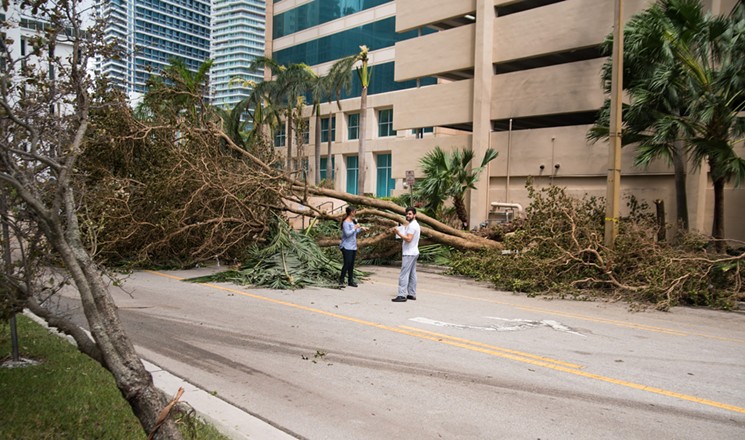
During the Storm
Madeline Vertilus scrunched her eyes closed against the primal roar outside and prayed. In truth, she'd been praying all night as Saturday turned into a dark Sunday and Hurricane Irma dealt body blow after body blow to her flimsy trailer.
Like many of the dozens of mostly elderly Haitian residents of the Little River Mobile Home Park near NW Second Avenue and 79th Street, Vertilus couldn't afford to leave. No one from the county showed up with buses to evacuate them. And anyway, Vertilus worried that shelters would be too loud to hear herself pray.
So the short 56-year-old with friendly eyes and a full laugh stayed put. And she prayed for safety. I get scared, I'll lose faith, she told herself.
And then, with a pop that made her jump from her wooden chair, the cereal-box size window in her kitchen door exploded. Vertilus moved her chair and asked God for protection.
On Sunday, Irma roared into Miami with a force that few expected. Instead of continuing its track toward the Gulf, at 9:10 a.m., the Category 4 hurricane's eye passed straight over Cudjoe Key, about 20 miles from Key West. As it spun northward all day, Irma's powerful right side raked South Florida with tornadoes and hurricane-force gusts. Brownish water quickly enveloped downtown streets. And everyone hoping to quietly ride out a minor storm realized they were in for a long, bad time behind the hurricane shutters.
Orlando Valle was taking a leak when Irma ruined his afternoon.
He and a couple of friends and others had taken refuge at a friend's place on the 19th floor of a Brickell high-rise, which seemed safer and sturdier than his Grove townhouse. They'd been bingeing on Game of Thrones when the 43-year-old took a bathroom break. Then came the blast, which sounded like a sledgehammer hitting the wall. When Valle peeked out, he saw an alarming hairline crack in the sliding glass balcony door.
"We were shitting bricks," said Valle, brown-haired, brown-eyed, and quick to smile.
Hastily, the friends packed their bags and stacked them by the front door. If the glass shattered, they could book it to a stairwell. They uneasily watched drywall peel off a nearby construction site and tumble to the ground like snowfall.
"These guys did not secure their stuff," Valle said. "We saw drywall flying all over the place."
Many tried to make the most of the storm. Downstairs in a Dadeland-area hotel, a petite Irishman named Dylan jumped onto a padded chair and loosened the first button of his starched gray shirt, then the second, then the third. In the background, on a small portable speaker, Aretha Franklin belted out "Respect." Dylan's hands moved downward with impeccable grace and surprising panache. The shirt came off.
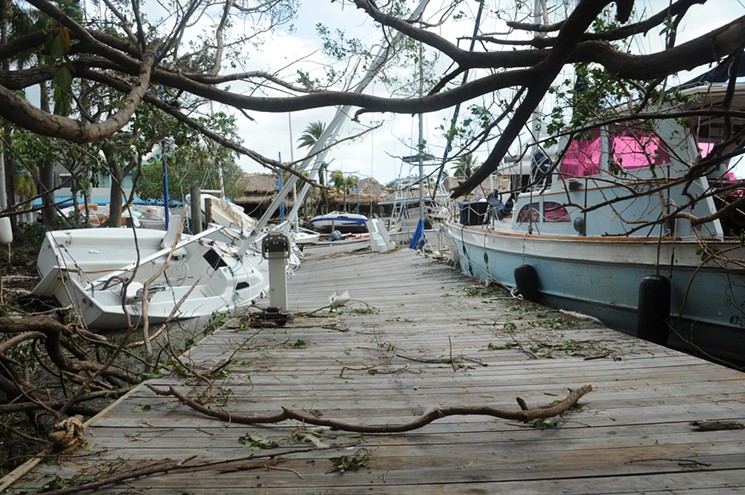
The strip tease was the pièce de résistance of an overnight party in the lobby, where a dozen stranded members of a British flight crew had stocked up on Coors Light, cheap white Zinfandel, and one splurgy bottle of Grey Goose. Cocktails mixed with stolen ginger ale poured freely into coffee cups swiped from the hotel bar. Drinking games were played with cups, cards, and Ping-Pong balls.
The wind tore through Miami-Dade all night and throughout the day Sunday. Around 10 a.m., it toppled a massive crane atop an under-construction, luxury, "New York-style" condo called Vice Miami at 300 Biscayne Blvd., leaving its heavy counterweight to batter the walls like a wrecking ball. City officials had warned earlier in the week that the 25 or so cranes around downtown might not withstand hurricane-force winds, and now they urged residents nearby to stay away from windows.
Then, around 2 p.m., another crane fell. This one plummeted off a Related Group project in Edgewater, leaving the structure dangling by supports. (Related's CEO, Jorge Pérez, was hanging in New York at the U.S. Open during the storm and apparently had no idea about the accident until a New Times writer reached him; a few hours later, a third crane, also on a Related project, crumpled in the storm. "There's no damage... [and] thank goodness, there's nothing that's happened to human life," Pérez said.)
Around the same time, someone sheltering in a nearby condo filmed the whole roof of an apartment building sheared off like the top of a sardine can.
In the Little River mobile home park, a power line fell and sparked a small fire. Someone called FPL, but authorities never arrived. After her window blew out, Madeline Vertilus retreated to a small bedroom where a relative was asleep — only to notice the ceiling dangerously sagging with rainwater. She woke her relative, and they hastily moved clothes out of the way of dripping water.
"Thank God he was sleeping in here," Vertilus says. "Otherwise, we wouldn't have known the water was coming in."
By 4:30 p.m. at Dinner Key Marina, Randy — AKA Captain Skeletor — found himself stranded on a boat in the pounding surf. The Pittsburgh native had spent years working on boats, but he'd never faced a situation like this one. He decided to jump for it.
The former shrimper pulled on a slicker, braced against the wind, and made a running leap for the cement dock. He landed with a thud and then kept on running. He could barely stand upright in the rain bands, but somehow he made it a mile or so to an ex-boss' place near Mary's Coin Laundry & Deli, where he collapsed into a truck outside the house and fell asleep.
"I was scared as fuck," he admits.
After the Storm
Around lunchtime Monday, Latoshia and Roberto Acevedo waited for a ride to a shelter they didn't know about before heading home to an apartment they weren't sure still existed.
"I might have lost everything," Roberto said.
Five days after evacuating their Florida City home with their three children — ages 8, 12, and 14 — they spent the weekend sleeping on slabs of cardboard on the floor of South Miami Senior High, which lost power midway through the storm. Inside the school, hot air filled the hallways and bins of trash piled outside classrooms. Cell service was practically nonexistent, but they'd been told the Homestead area was without electricity.
"We're not going home yet because there's no power and a lot of flooding, and we don't know what's going on over there," Latoshia said. "We're just going to go to another shelter now, but where? We don't have the slightest clue."
In the hours after Irma left, South Florida emerged blinking from dented hurricane shutters to find roads that looked like collateral damage in a Texas Tree Massacre and scores of downed power lines. There's no doubt Miami dodged a catastrophic, worst-case scenario — the more severe damage in the Middle and Upper Keys will likely take weeks to assess — leaving thousands homeless and, perhaps, a significant body count.
But the Magic City took a heavy hit from Irma. The city's first true hurricane in 12 years left nearly two million people without power, flooded homes and apartment complexes, and billions of dollars in damage. The millions who fled the storm now face the uncertain prospect of trying to get home through clogged highways and gas shortages.
Still, by Monday, Miamians tried to take it in stride. As restaurants and bars reopened, lines stretched around the block as people desperately sought a hot meal and a cold beer.
Cash in hand, Drew Kang sidled up to the bar at the Grove Spot and demanded shots. "Let's have some fun!" he said. "We survived!"
Outside, trees had toppled onto the streets of Coconut Grove, and countless locals were without electricity. But inside, a diesel generator powered the ice machine, an ATM, and a handful of outlets for people to charge their phones. The only thing missing was some ambient sound.
"Let's play some music," shouted Kang, a 36-year-old bar regular who runs the Coco Cigars shop next door. "Let's play some Frank Sinatra."
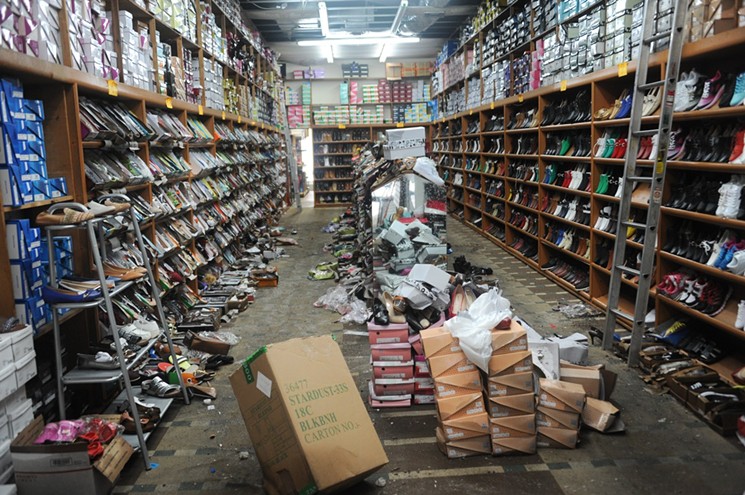
Kang had been posted up in the swampy restaurant since it opened around 10:30 a.m. Monday. He was joined by an elite group of early birds who had snagged a hot meal before the kitchen closed at noon. "I didn't even have to skip a beat," he said. "The community is amazing in the Grove because they look out for their locals."
In the MiMo District, regulars wandered up to Jimmy's Eastside Diner, where the climactic scene of the Oscar-winning movie Moonlight was filmed. Stephen Gamson sipped a cup of coffee as he explained he comes to Jimmy's four to five times a week. He had driven over on the off chance he'd find the place open. Sure enough, Dennis, the restaurant's owner, welcomed him and others from the neighborhood inside. "We're getting back to normal bit by bit," Gamson said.
Jimmy's didn't actually open for business, but Dennis brewed free coffee for anyone who showed up. He also tried to cook a few meals for people who needed it. He'd driven around trying to pick up some employees, but it was hard with downed trees everywhere.
His wife Angie fed liver and onions with fries and broccoli to an elderly regular — his first hot meal in days.
By 3 p.m. that afternoon, the nearby Ms. Cheezious filled with people. The restaurant's owner did double duty, bussing tables and helping in the kitchen while two employees managed the throngs of people waiting to order. A customer requested a patty melt, and Jessica, who works the counter, said they were all out. "Try the short-rib sandwich. It's my favorite."
The kitchen was so backed up it needed a 15-minute break to keep up, Jessica explained to customers in line while taking their orders for beer and soda so they could at least have a cold beverage.
Many others spent the day digging their homes out of a carnage of downed branches and debris.
Canela Iacoco, a woman with a thin nose, nervous eyes, and dyed-blond hair, stood on NE 62nd Street in a blue-and-white shirt raking leaves into a black plastic trash bag. Across the street, a group of men in their early 20s used machetes to hack at a large log splayed across the road.
"We rode it out here," she said, pointing at her cream-colored one-story home, "just me and my two kids. I put them in the closet. We all went through Andrew, so for them, this one was kind of fun."
In South Miami-Dade, which never really recovered from Andrew, Joseph Tokarsky and Jerry Dailey shoveled dirt Tuesday afternoon in search of a busted water pipe. After a towering Northern pine fell on the chain-link fence dividing their properties, Dailey had been without water since the weekend. "We gotta do it ourselves because the county is gonna take so long," Dailey said, more amused than annoyed.
Up and down SW 158th Place, neighbors cleared debris from the road and fixed one another's chainsaws. A tangled pool ladder, a broken DirecTV dish, and piles of tree branches lay in heaps in front of still-shuttered houses. Twenty-eight-year-old Eli Montalvan pointed to the roof above his bedroom, where a tree had fallen Saturday night as he lay in bed scrolling through Facebook. Thankfully, the roof didn't cave in.
"It was just a big boom," he said. "You couldn't even walk through here. The whole yard was covered in branches. It was a mess. It was brutal."
Back at Dinner Key Marina Monday afternoon, Randy — who had jumped to save his life — sat quietly smoking a Marlboro on an overturned boat dotted with barnacles. The marina's parking lot was still flooded with a few inches of water. Seagrass and stray life jackets filled the new pond.
Randy was still shaking from his near-death-by-hurricane. Another small boat he owns had vanished from the marina in the storm, but — remarkably — Hardball, which had almost shaken loose before he jumped, stayed put.
Randy knows he got lucky. But he'll never stay on a boat during a hurricane again. "I'm an idiot," he said. "I just like having fun. You can't hurt me. This Irma, it coulda hurt me."
Tim Elfrink, Jessica Lipscomb, Brittany Shammas, Jerry Iannelli, Laine Doss, and Zachary Fagenson contributed to this report.

